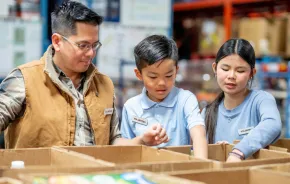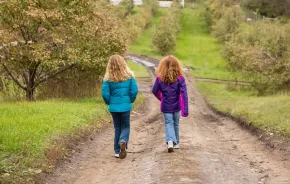
Beyond Sticks and Stones: Parenting Essentials to Prevent and Address Bullying
April 10, 2012, 7-9 p.m. at the Seattle Center
Tickets: $20 in advance/$25 at the door; available on Brown Paper Tickets
Age: 6-16 years
 A must-attend lecture for parents concerned about bullying
A must-attend lecture for parents concerned about bullying
On April 10, national anti-bullying educator Rosetta Lee will be discussing how to identify the warning signs of bullying; key gender and cultural differences with respect to how children experience and deal with bullying; and pragmatic and empowering guidance and tools for parents to effectively prevent and address bullying issues. Her talk will also focus on how parents can best open a dialogue with their children that allows them to communicate and keep them safe.
We had a chance to interview Lee about the topics she'll be covering in her April 10 talk.
You say boys and girls experience bullying differently — in what ways?
Much of bullying surrounds society's expectations and stereotypes about girls and boys and what they are supposed to be. There is so much focus on a girl's looks and relationships, and they are pressured to be nice and polite and not express direct aggression. The focus for boys is on their physical power and strength, and they are expected to be bellicose and physical. These differences affect how bullying occurs.
Girls are targeted around things like not being pretty enough or popular enough: The bullying social collective comes in the form of cliques, and the tools of bullying are indirect (eye rolling, rumors, avoiding, etc.). Boys are targeted around being not big enough or tough enough: The bullying social collective comes in the form of sports teams and gangs, and the tools of bullying are pushing, name-calling, and threats. It is so important to name all forms of bullying behavior to help our kids recognize bullying when and where it happens.
Why is comprehensive and inclusive gender and sexuality education critical in reducing bullying?
Our children are policed pretty strictly on gender norms through bullying. The better they understand the difference between biological sex, gender identity, gender expression, and sexual orientation, how all of these may be related but not necessarily connected, how all of these categories exist in a spectrum rather than in a binary, how people exist in all combinations along the spectrums, and how we should all treat people with dignity and respect, much of the bullying young people experience will be reduced.
I know people will argue that not everyone is ready or willing to be accepting of LGBTQ people. I think we have to be realistic, though, and acknowledge that LGBTQ people DO exist, and most of us can get behind treating fellow human beings with kindness and respect. It's important to not leave sexual orientation out of the discussion, because research shows that, if levels of anti-gay bullying go down in a school environment, levels of all forms of bullying go down. It's in all of our kids' best interest— even the straight ones — to reduce anti-gay bullying.
How do we stop cyber-bullying?
I know there is much focus on cyber-bullying, but I think we shouldn't get distracted by it that much. It is just another form of bullying — we can't address cyber-bullying without addressing the root causes of why bullying happens in the first place. However, it is important to teach kids digital citizenship and cyber safety. We are still in a generational cusp — we are digital immigrants teaching digital natives. You and I learned how to socialize, build relationships, work together, and talk to one other as young people before we got access to technology. Kids today get access to the technology before they have a chance to develop these skills, and we don't do enough mitigation and mediation to make sure they are developing healthy versions of these skills despite the technology or even using the technology.
We also need to teach children the importance of face-to-face conflict resolution. In person, as you stumble to figure out how to express yourself, you may make slips in judgment and say something awful to someone. You wish you could take it back, apologize for what you said, and try to repair the relationship. You and the other person are the only people who know about the interaction. When you post something awful in an online context, particularly on platforms like Facebook — and even if you apologize and even if the other person forgives you and even if you remove the post — what you said is permanently online as people quote it, forward it, share it, re-post it, and more.
There has been a recent rash of young people posting racist rants on YouTube, and even after they were reprimanded and apologized, the digital footprint of the posts spread wide and far, resulting in hate mail, dismissal from school, and social rejection. I think about these poor kids who will forever fear that schools they apply to, people they develop relationships with, and employers they try to get a job from might discover this digital footprint and reject them. I wish I could have told these kids the golden rules of digital communication:
1. If you wouldn't say it in person, don't say it digitally.
2. Would you be okay with what you said or a picture/video posted being the headline story in a major newspaper? If not, don't say it or post it.
3. If someone Googled you, what kind of digital persona would they find? Are you proud of this persona, and does it match the kind of person you want to be seen as forever?
Can films about bullying help kids better understand and cope with bullying?
Young women find Finding Kind incredibly moving, and they want to create change for relationships among girls and women. For me, kindness goes beyond surface niceness and sweeping problems under the rug. Kindness is an authentic love for yourself. Kindness is a genuine curiosity in and acceptance of others. Kindness is respectful and honest discourse even in conflict. And kindness is a true forgiveness for others' shortcomings and mistakes. I hope that young women can find this sort of kind and come together in solidarity and mutual support.
What can parents do to help prevent bullying?
• Teach young people social skills — particularly conflict resolution and communication skills.
• Give young people opportunities to make a difference in the world.
• Teach them diversity and inclusion skills.
• Help young people develop real self esteem — not narcissistic and delusional views of themselves, but the ability to see clearly all their strengths and faults and still feel good about themselves.
About Rosetta Lee's April 10 lecture
Beyond Sticks and Stones: Parenting Essentials to Prevent and Address Bullying
April 10, 2012, 7-9 p.m. at the Seattle Center
Tickets: $20 in advance/$25 at the door
Age: 6-16 years











